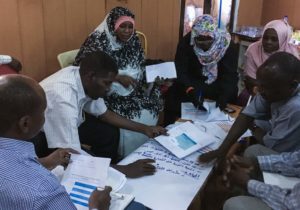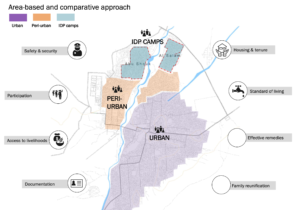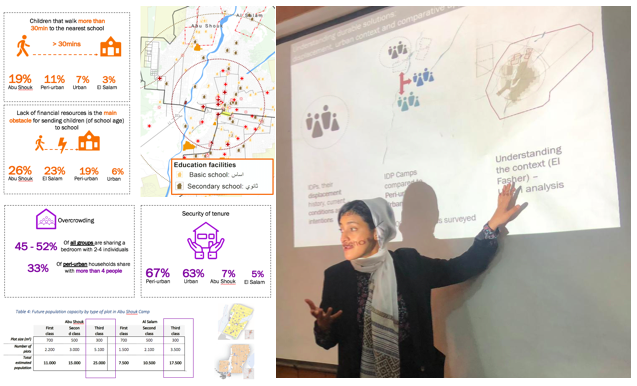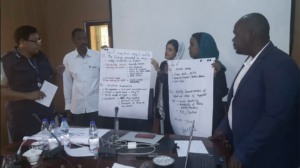JIPS is currently supporting the final stages of a profiling exercise and durable solutions analysis in North Darfur, Sudan, in collaboration with the World Bank, the Sudanese Government’s Joint Mechanism on Durable Solutions, the local authorities in El Fasher and the international community represented by the Durable Solutions Working Group.
As part of the process, JIPS joined partners last November to explore the collected data and work together on the preliminary data analysis so that it can be used to feed into joint programming and local development plans. This is a critical step in a profiling process, as many other exercises have demonstrated in the past (see the case of Kosovo), and proves greatly beneficial.

Participants from UN agencies and government departments discussing data on adequate standard of living.
Solutions-oriented responses to displacement require a broadly shared and comprehensive analysis of the displacement situation among stakeholders in order to most effectively target interventions as well as ensure complementarity between actors. For this purpose, in Sudan partners opted for a combined approach involving the following aspects:
The analysis stage – i.e. where data is explored and discussed and where preliminary findings are formulated – is critical to sustain trust and agreement on the evidence and hence support a coordinated and comprehensive strategy to support durable solutions. For this purpose, a joint analysis workshop was held in El Fasher on the 22 November 2018.
Hosted by the Ministry of Finance, Civil Service and Economy with support from the Humanitarian Affairs Coordinator, the workshop brought together a diverse group of stakeholders with a range of technical capacities and contextual knowledge from different sectors, including the director generals and staff from the line ministries as well as representatives from the UN coordination team and NGOs.
During the workshop, we jointly reviewed the preliminary findings from the profiling exercise in order to collaboratively interpret them and inform the direction of how partners will be able to use the information. We also worked to ensure that the analysis addresses the information needs of the different partners and to make clear linkages how the profiling will feed into the remaining steps of the durable solutions process.
More specifically, the workshop entailed:
The preliminary data was presented in different areas aligned with the eight durable solutions criteria, including adequate standard of living, long-term safety and security, access to livelihoods, economic well-being and food security, and employment. Data across these criteria was presented and discussed through visual methods tailored to the audience that allowed for better and quicker understanding, including in a comparative manner and in line with the area-based approach, making distinctions not only on the displacement status of the population but also on the location where they are settled in relation to the urban area of El Fasher: the IDP camps, the peri-urban area, or the urban centre.

Overview of the comparative approach, including core demogra[hic data, population’s future intentions, and the 8 durable solutions criteria examined through an area-based approach looking at populations in the two IDP camps, the peri-urban areas and the urban centre.
When relevant, the population data was explored in light of the results of the urban analysis of El Fasher. This was particularly important when discussing access to services, housing and land availability, and potential implications for local integration. As highlighted by the urban analysis, among others the low-density urbanisation patterns pose substantial pressure on local authorities to provide and maintain adequate public services. This means that more than 50% of the neighbourhoods of El Fasher do not have access to adequate public services and facilities.

Using data visualisation to present findings on access to services, housing conditions and tenure, in relation to the urban analysis of El Fasher.

The participants were divided in groups based on thematic expertise and areas of interest. Participants were asked to explore and discuss the data, identify gaps and areas of greater interest based on their technical and contextual knowledge. They were also invited to reflect on how the preliminary findings compare to the official benchmarks and standards in El Fasher, to identify existing complementary data that can further inform this analysis, and to discuss these findings in light of joint programming and local development plans.

Participants presenting gaps and suggestions for further analysis related to long term safety and security.
The workshop discussions around the data and preliminary findings were positively received by the government, UN and NGO participants, particularly emphasising the relevance for this type of data and the importance of deepening the analysis through additional joint sessions and validation activities. The workshop concluded with an initial consolidation of key findings and jointly agreeing upon the subsequent direction of the analysis, including these next steps: